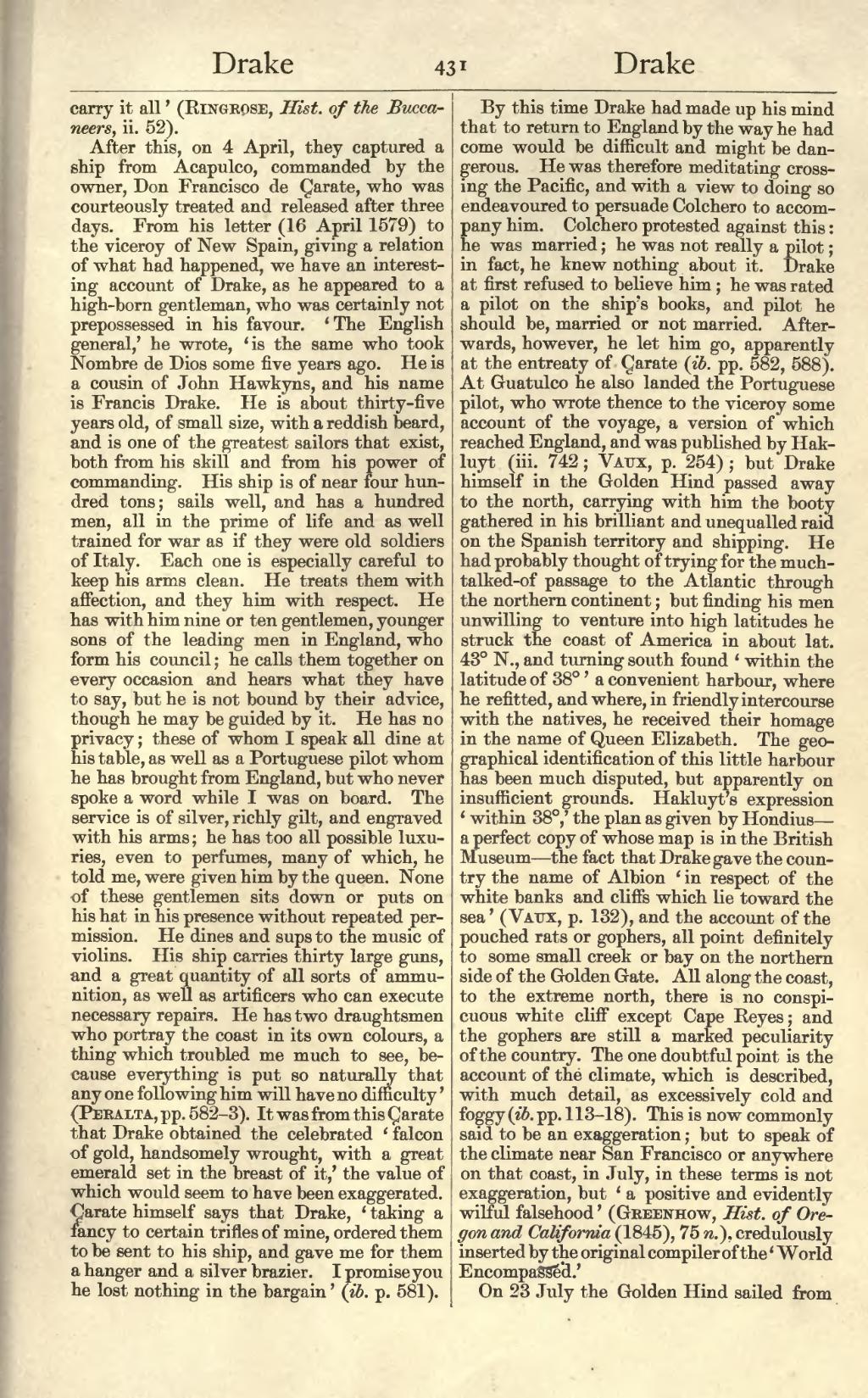carry it all ' (Ringrose, Hist. of the Buccaneers, ii. 52).
After this, on 4 April, they captured a ship from Acapulco, commanded by the owner, Don Francisco de Çarate, who was courteously treated and released after three days. From his letter (16 April 1579) to the viceroy of New Spain, giving a relation of what had happened, we have an interesting account of Drake, as he appeared to a high-born gentleman, who was certainly not prepossessed in his favour. `The English general,' he wrote, 'is the same who took Nombre de Dios some five years ago. He is a cousin of John Hawkyns, and his name is Francis Drake. He is about thirty-five years old, of small size, with a reddish beard, and is one of the greatest sailors that exist, both from his skill and from his power of commanding. His ship is of near four hundred tons; sails well, and has a hundred men, all in the prime of life and as well trained for war as if they were old soldiers of Italy. Each one is especially careful to keep his arms clean. He treats them with affection, and they him with respect. He has with him nine or ten gentlemen, younger sons of the leading men in England, who form his council; he calls them together on every occasion and hears what they have to say, but he is not bound by their advice, though he may be guided by it. He has no privacy; these of whom I speak all dine at his table, as well as a Portuguese pilot whom he has brought from England, but who never spoke a word while I was on board. The service is of silver, richly gilt, and engraved with his arms; he has too all possible luxuries, even to perfumes, many of which, he told me, were given him by the queen. None of these gentlemen sits down or puts on his hat in his presence without repeated permission. He dines and sups to the music of violins. His ship carries thirty large guns, and a great quantity of all sorts of ammunition, as well as artificers who can execute necessary repairs. He has two draughtsmen who portray the coast in its own colours, a thing which troubled me much to see, because everything is put so naturally that any one following him will have no difficulty' (Peralta, pp. 582-3). It was from this Çarate that Drake obtained the celebrated `falcon of gold, handsomely wrought, with a great emerald set in the breast of it,' the value of which would seem to have been exaggerated. Çarate himself says that Drake, ` taking a fancy to certain trifles of mine, ordered them to be sent to his ship, and gave me for them a hanger and a silver brazier., I promise you he lost nothing in the bargain' (ib. p. 581).
By this time Drake had made up his mind that to return to England by the way he had come would be difficult and might be dangerous. He was therefore meditating crossing the Pacific, and with a view to doing so endeavoured to persuade Colchero to accompany him. Colchero protested against this: he was married; he was not really a pilot; in fact, he knew nothing about it. Drake at first refused to believe him ; he was rated a pilot on the ship's books, and pilot he should be, married or not married. Afterwards, however, he let him go, apparently at the entreaty of Çarate (ib. pp. 582, 588). At Guatulco he also landed the Portuguese pilot, who wrote thence to the viceroy some account of the voyage, a version of which reached England, and was published by Hakluyt (iii. 742 ; Vaux, p. 254); but Drake himself in the Golden Hind passed away to the north, carrying with him the booty gathered in his brilliant and unequalled raid on the Spanish territory and shipping. He had probably thought of trying for the much-talked-of passage to the Atlantic through the northern continent; but finding his men unwilling to venture into high latitudes he struck the coast of America in about lat. 43° N., and turning south found ` within the latitude of 38°' a convenient harbour, where he refitted, and where, in friendly intercourse with the natives, he received their homage in the name of Queen Elizabeth. The geographical identification of this little harbour has been much disputed, but apparently on insufficient grounds. Hakluyt's expression `within 38°,' the plan as given by Hondius—a perfect copy of whose map is in the British Museum—the fact that Drake gave the country the name of Albion ` in respect of the white banks and cliffs which lie toward the sea' (Vaux, p. 132), and the account of the pouched rats or gophers, all point definitely to some small creek or bay on the northern side of the Golden Gate. All along the coast, to the extreme north, there is no conspicuous white cliff except Cape Reyes; and the gophers are still a marked peculiarity of the country. The one doubtful point is the account of the climate, which is described, with much detail, as excessively cold and foggy (ib. pp. 113-18). This is now commonly said to be an exaggeration; but to speak of the climate near San Francisco or anywhere on that coast, in July, in these terms is not exaggeration, but `a positive and evidently wilful falsehood' (Greenhow, Hist. of Oregon and California (1845), 75n.).credulously inserted by the original compiler of the ` World Encompassed.'
On 23 July the Golden Hind sailed from
